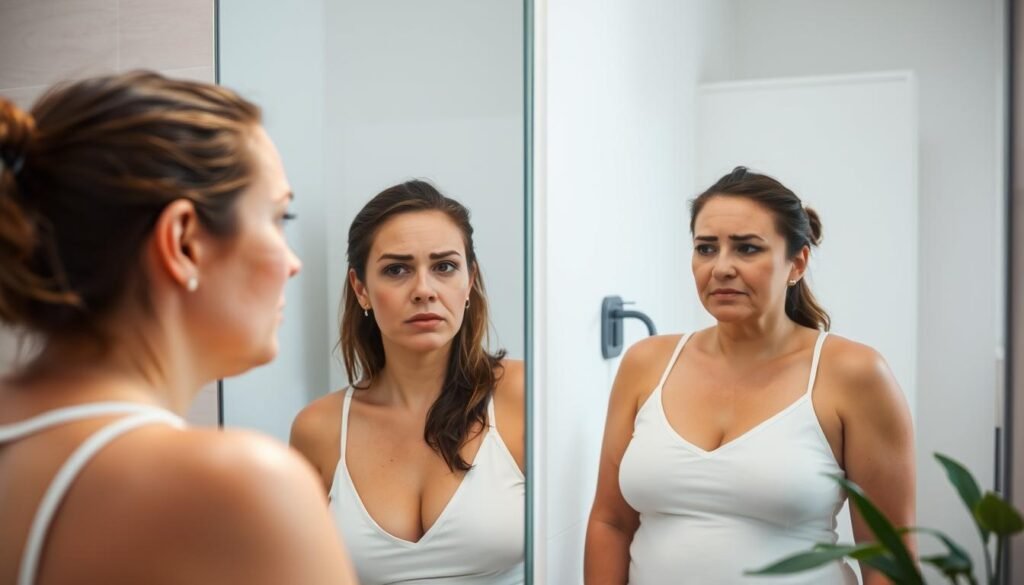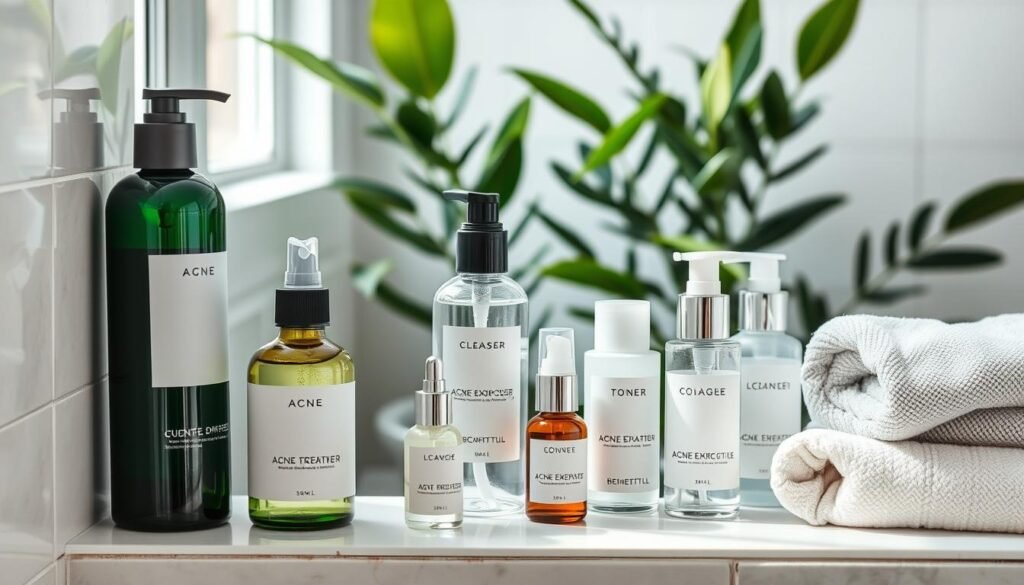About 10% of women at childbearing age suffer from Polycystic Ovary Syndrome (PCOS). This makes it a top hormonal disorder. It doesn’t just affect fertility; it also causes issues like acne. Many with PCOS skin problems have faced acne at some point. It usually shows as cystic acne, which is more profound and often found on the chin or jawline. The hormonal imbalances from PCOS, like higher androgen levels, can mess up the skin’s balance. This results in more oil and blocked pores. Knowing how PCOS and acne are linked helps people find good treatments. This leads them toward having clearer skin.
Treating PCOS calls for a plan that includes both medical help and lifestyle changes. There are many ways to tackle PCOS symptoms. These include hormone treatments like birth control pills and topical remedies. Making changes in diet and exercise is also key. Everyone trying to deal with PCOS skin issues should consider these strategies. They are vital in finding comfort and clearer skin.
Key Takeaways
- PCOS affects about 10% of women, leading to hormonal imbalances that can cause acne.
- Cystic acne is frequently associated with PCOS, often appearing deeper under the skin.
- Effective treatment options include hormonal medications and lifestyle changes.
- Managing PCOS symptoms is crucial for improving overall skin health.
- Oral contraceptives can significantly reduce the occurrence of acne in those with PCOS.
What Is PCOS?
Polycystic Ovary Syndrome (PCOS) is a common hormonal problem for women in their fertile years. It leads to irregular periods, high androgen levels, and polycystic ovaries. About 10% of women who can bear children face PCOS. They deal with problems like acne, more body hair, and gaining weight.
Scientists haven’t pinpointed the exact cause of PCOS. But genes and environment both matter. It often makes the body resistant to insulin. This can make losing weight harder and raise diabetes risks. So, controlling PCOS is very important for health.
PCOS does more than just hurt the body. It affects emotions too. Acne gets worse, especially during periods, due to increase in testosterone. This acne is usually bigger and deeper, often found on the jawline and upper neck.
To find out if it’s PCOS, doctors do blood tests to check hormones, sugar, and cholesterol levels. An ultrasound might also show ovarian cysts. Knowing about PCOS helps women manage it better for a healthier life.
Understanding Hormonal Imbalance
Hormonal imbalance is a big problem for women, especially those with polycystic ovary syndrome (PCOS). This condition affects about 5 to 10 percent of women. It leads to various symptoms, including acne. At the heart of this issue is androgen excess, with ovaries making too much male hormone like testosterone. This messes up the balance of estrogen and progesterone, making skin problems worse.
When testosterone levels are high, sebaceous glands produce more oil. This makes the skin more prone to acne. Women with PCOS often see breakouts in areas sensitive to hormones, like the lower part of the face. Being aware of these hormone changes helps manage skin health better.

It’s important to care for and treat PCOS symptoms and hormone imbalances properly. Hormonal therapies, like combination oral contraceptives (COCs), can lower androgen levels. This results in less acne. Birth control pills such as Estrostep, Ortho Tri-Cyclen, and Yaz are FDA approved for acne. These treatments usually take three months to show results, teaching us to be patient.
To learn more about how different factors affect skin, visit this site. Knowing how hormonal imbalances and skin health are linked can help women find the right treatments for them.
Connection Between PCOS and Acne
PCOS and acne are closely linked due to hormonal changes. Women with PCOS have higher androgen levels. These changes cause skin problems like hormonal acne.
How Hormones Affect Skin
Increased levels of androgens, such as testosterone, lead to more oil on the skin. This can block pores and create stubborn hormonal acne. PCOS often makes acne worse during the menstrual cycle, especially on the lower face.
Acne in women with PCOS can be tough, starting even after 25. It leads to bigger, painful spots that heal slowly.
Cystic Acne and PCOS
Cystic acne is a harsh form of hormonal acne linked to PCOS. It appears as painful, deep bumps under the skin, mainly on the chin, jawline, or cheeks. Unlike other acne, cystic acne requires special treatment focusing on the hormonal causes.
This acne type is hard to get rid of and seriously affects one’s life.
| Characteristic | Typical Acne | Cystic Acne |
|---|---|---|
| Location | Face, chest, back | Chin, jawline, lower cheeks |
| Pain Level | Generally mild | Severe pain and discomfort |
| Treatment Resistance | Usually responsive | Often resistant to standard treatment |
| Common Age Onset | Adolescence | Age 25 and up |
Symptoms of PCOS
Women with polycystic ovary syndrome (PCOS) often face various symptoms. These signs show hormonal problems that need attention for early help. Two main symptoms are irregular periods and excess hair growth, due to hormone imbalances.
Irregular Periods
Irregular periods rank high among PCOS symptoms. Women might skip periods or have longer cycles, affecting their ability to have children. Not ovulating regularly can cause heavy or painful periods, increasing the risk of anemia. Symptoms of PCOS like these stress the need for possible hormonal treatments. For more on how acne ties to hormonal issues, see this detailed article.
Hirsutism
Excessive hair growth, or hirsutism, causes a lot of emotional stress for women with PCOS. It happens because of high androgen levels. Treating hirsutism might also help with acne. Recognizing this symptom of PCOS pushes women to seek help early. Catching these symptoms early can hugely improve life quality.

PCOS and Acne: Treatment Options
Managing PCOS acne involves several treatments focusing on hormonal balance and skin care. Women with PCOS often face skin challenges due to high androgen levels. Knowing the right hormonal and topical treatments can help improve skin and well-being.
Hormonal Treatments
Hormonal treatments are key in managing PCOS acne. Birth control pills help regulate hormones, reducing testosterone and skin oil production. Anti-androgen drugs like spironolactone also help by lowering testosterone levels, which helps clear acne. These treatments are vital for women wanting to balance their hormones and get better skin.
Topical Solutions
Topical solutions are also crucial for acne management. Products like benzoyl peroxide and salicylic acid help with mild to moderate acne by clearing pores and easing inflammation. For tougher cases, doctors might suggest prescription-strength retinoids like isotretinoin to boost skin cell turnover and reduce acne. It’s important to talk with a healthcare provider to choose the best treatment plan.
Diet and Lifestyle Changes
Managing Polycystic Ovary Syndrome (PCOS) calls for big changes in diet and lifestyle. These efforts work to better symptoms and overall health. With the right focus on eating and moving, you can tackle issues like insulin resistance. This problem is common in women with PCOS.
Foods to Include
Eating a range of whole foods is key in handling PCOS. Foods that fight inflammation, such as leafy greens, nuts, and whole grains, help with hormone levels. The Mediterranean diet, rich in healthy foods, is great for reducing PCOS-related inflammation.
- Leafy greens
- Nuts and seeds
- Whole grains
- Fatty fish, like salmon
- Non-starchy vegetables
- Legumes
- Fruits, particularly berries
Steer clear of processed stuff like fried foods and sugary drinks. Opting for water helps manage insulin resistance and supports good health.
Physical Activity and Its Impact
Staying active is crucial for women with PCOS. Experts recommend at least 150 minutes of exercise per week. It can lessen symptoms and boost mood by lowering stress. Mixing cardio with strength-training exercises offers the best benefits.
Regular workouts help with hormone balance and health. Active folks see better menstrual cycles and weight control. Including skincare with exercise routines can also aid acne management. Knowing how exercise affects acne might motivate you to keep moving.
Other Skin Symptoms Associated with PCOS
PCOS goes beyond just causing acne; it can lead to skin issues like acanthosis nigricans. This condition causes dark patches on the neck, armpits, and groin. It’s a sign of insulin resistance, often linked to PCOS. Around 30% of women with PCOS get acanthosis nigricans. This makes it an important symptom to keep an eye on.
Dandruff is another common skin problem for those with PCOS. It happens on the scalp and might make someone feel embarrassed. Seborrhea, leading to dandruff, affects about 29% of women with PCOS. Tackling these issues involves different methods. These can range from changing your diet to using creams and maybe even pills.
With many PCOS patients having skin symptoms, getting the right treatment is key. Dealing with acne and other skin problems can really help someone feel better about themselves. Sticking with treatment and knowing how life choices affect skin health are key steps in symptom management.
Managing Acne with a Good Skincare Routine
It’s crucial for those with acne, especially women with PCOS, to have a good skincare routine. About 40% of people with PCOS struggle with acne. This shows how important it is to create skincare routines that really work for acne management.
There are several key steps to a better skincare routine. Start with a gentle cleanser, like Replenix Green Tea Gentle Soothing Cleanser, that doesn’t irritate the skin. Next, an oil-free moisturizer keeps skin hydrated without causing breakouts. Choosing non-comedogenic products is a smart move because they won’t make acne worse.
Adding products like retinoids, which come from Vitamin A, to your routine can make a big difference. They’re great at unclogging pores, controlling oil, and reducing inflammation. This is especially helpful for PCOS-related acne. Use chemical exfoliants, like glycolic or lactic acid, to avoid skin damage from harsh scrubs.
Eating a healthy diet is also important for skin care. Foods high in antioxidants and vitamins can make your skin look better. Eating fish with omega-3 fatty acids could help your skin too. A study showed eating fish every day could reduce acne.
For the best results, combine your skincare routine with healthy living habits. Managing your stress can help balance hormones, which might reduce acne. Exercises like strength training could also help by improving your body’s response to insulin, possibly lowering androgen levels linked to acne.
| Skincare Steps | Purpose |
|---|---|
| Gentle Cleanser | Removes impurities without irritation |
| Oil-Free Moisturizer | Keeps skin hydrated without clogging pores |
| Non-Comedogenic Makeup | Prevents exacerbation of acne |
| Topical Retinoids | Unclogs pores and reduces inflammation |
| Chemical Exfoliants | Minimizes risk of skin microtears |

Stick to a good skincare routine to see big improvements in your skin health, especially for those with PCOS. Mixing good skincare habits with the right diet and lifestyle changes helps better your skin and overall health.
Conclusion
It’s key to understand how PCOS and acne are linked to manage this hormone issue well. Acne often comes from too much androgen. So, looking into treatments like hormone therapy is important. These include pills and possibly spironolactone for tough cases. They help clear the skin and lessen other hard symptoms.
Making changes to your lifestyle is also crucial. Eating well and staying active are big parts of feeling good. These steps help with PCOS symptoms such as acne and also boost your long-term health. Around 5% to 10% of people born female may have PCOS. Knowing how to handle it is super important for them.
Working with doctors to create a care plan just for you is very helpful. This plan lets people with PCOS deal with acne better and improve their health. By focusing on health and skin, those dealing with PCOS can hope for a happier, clearer future.